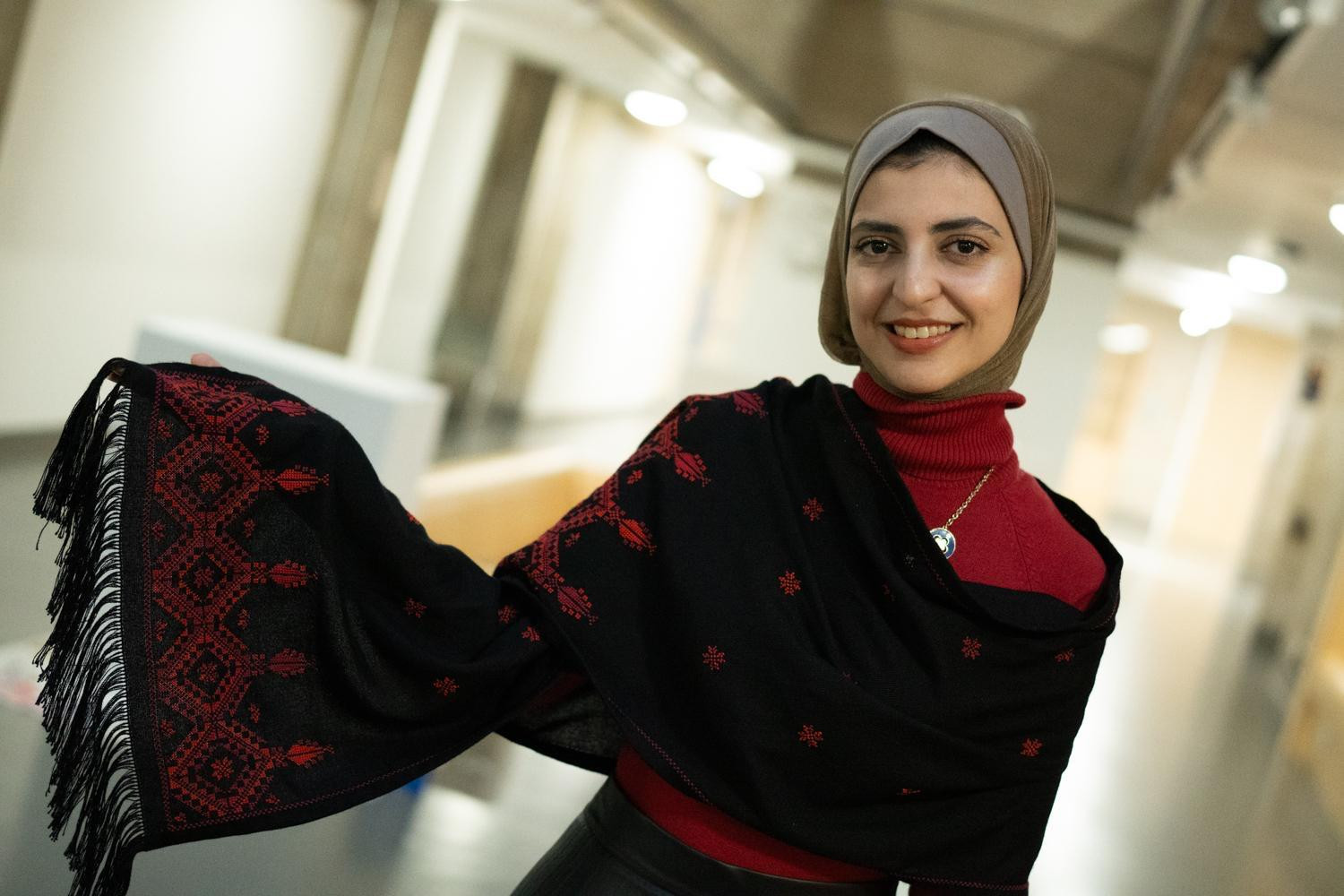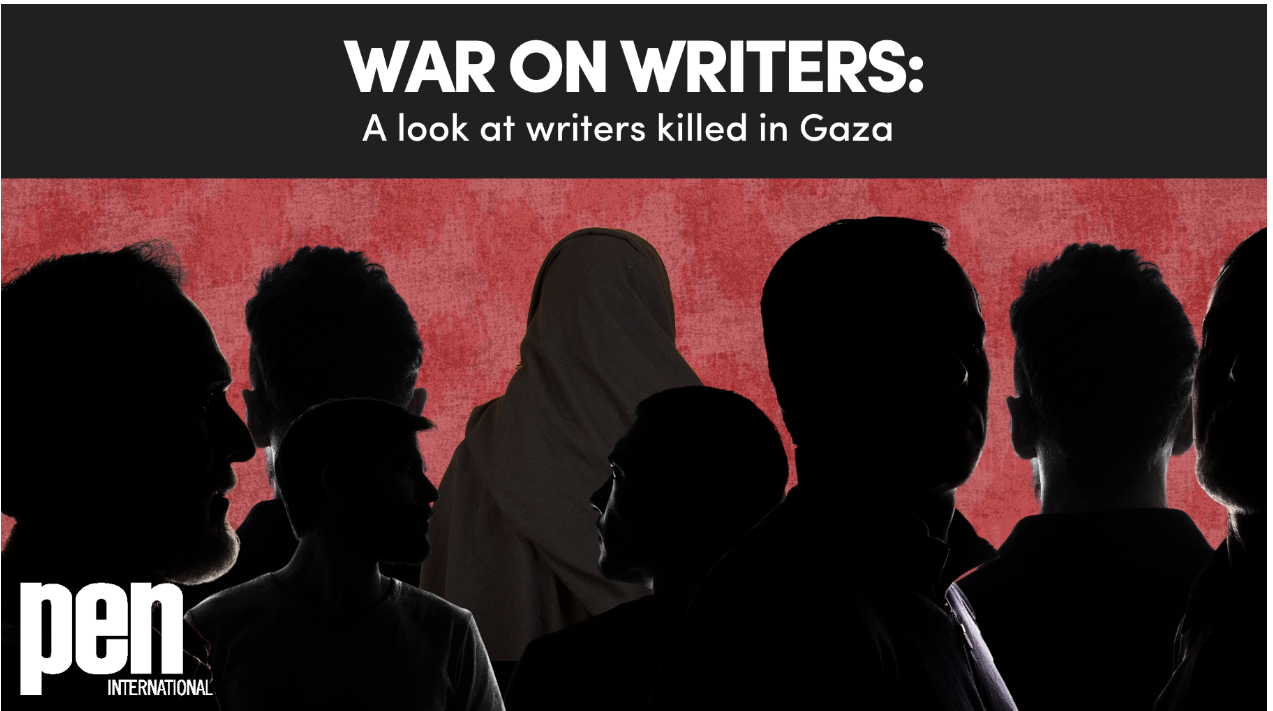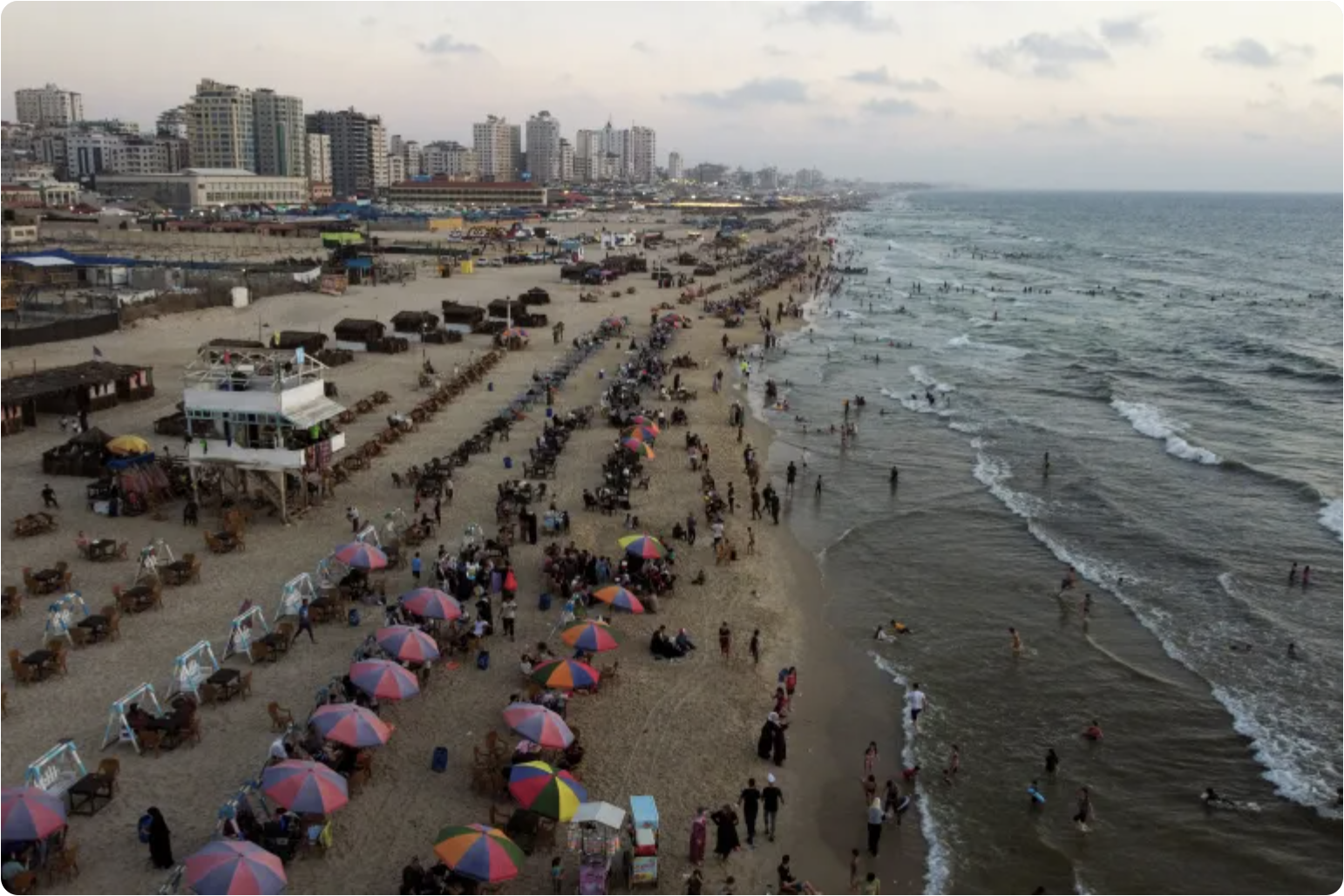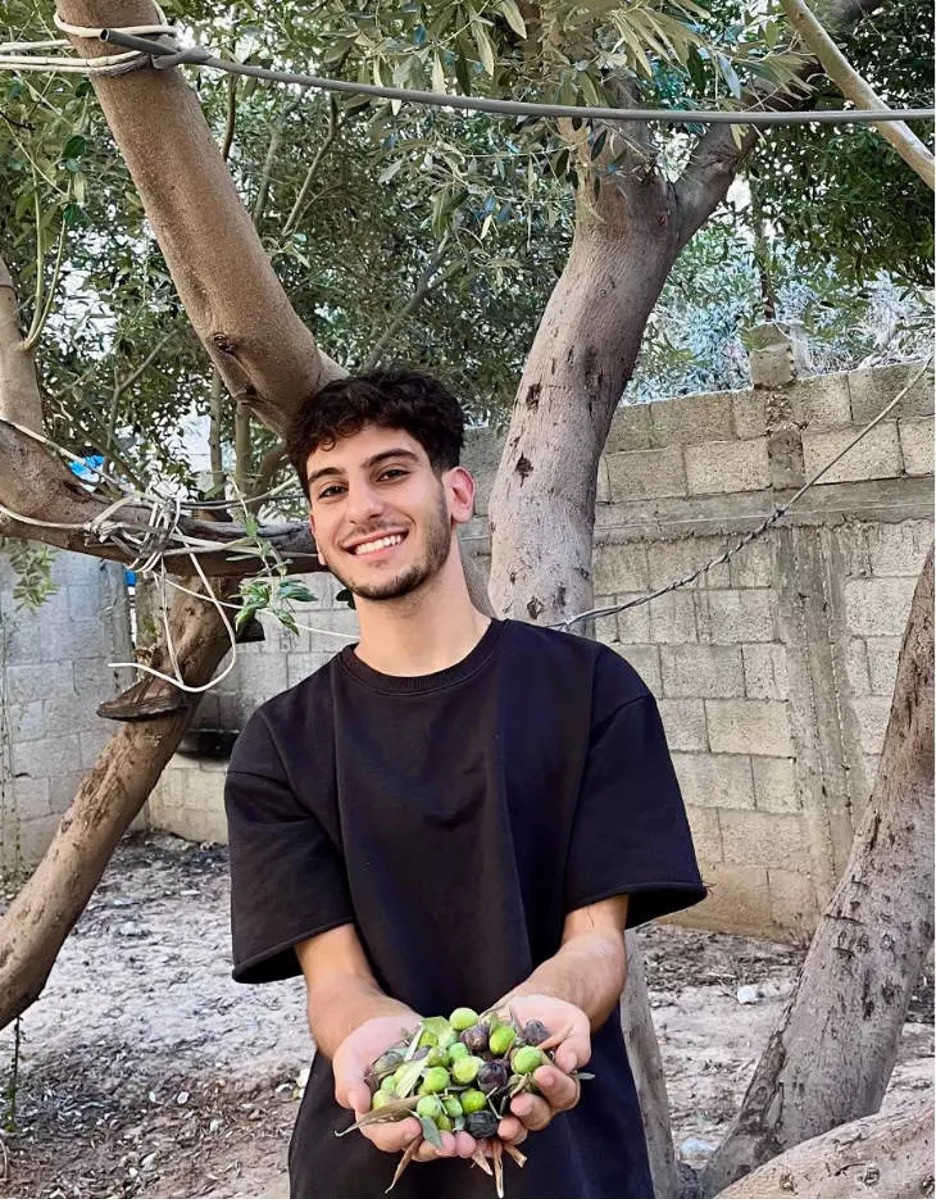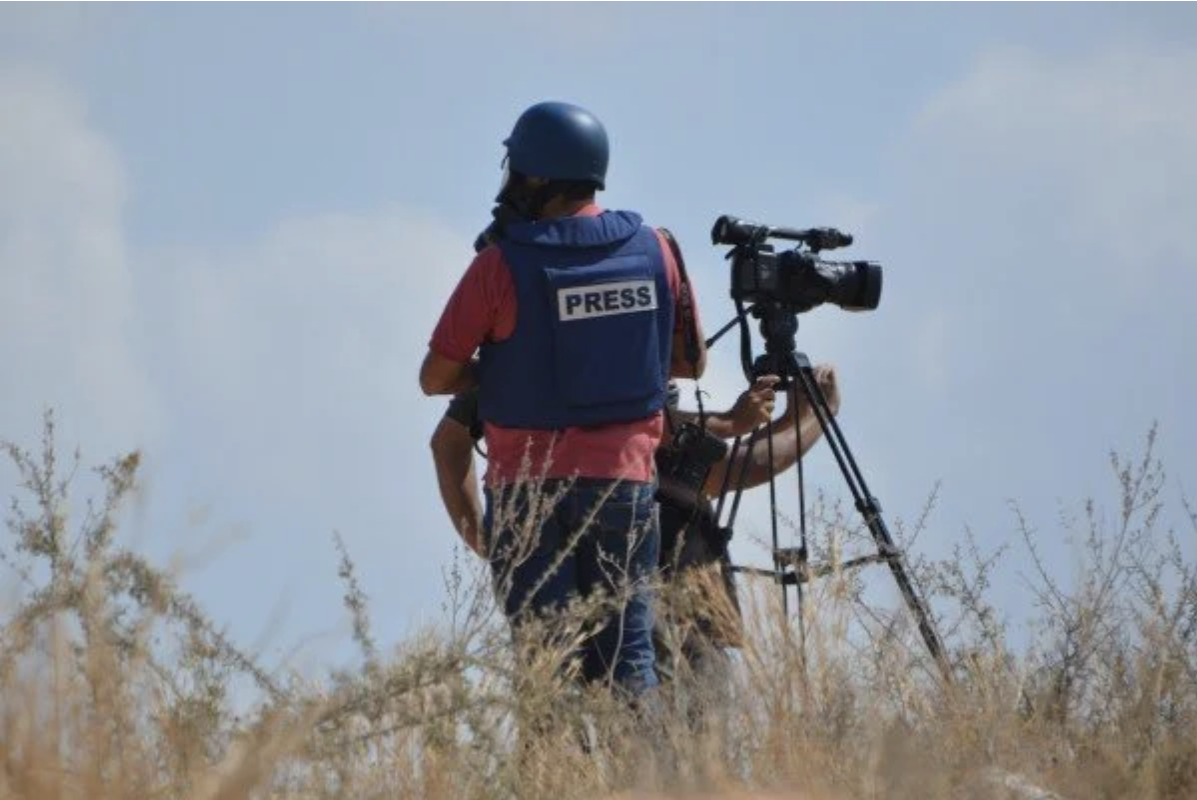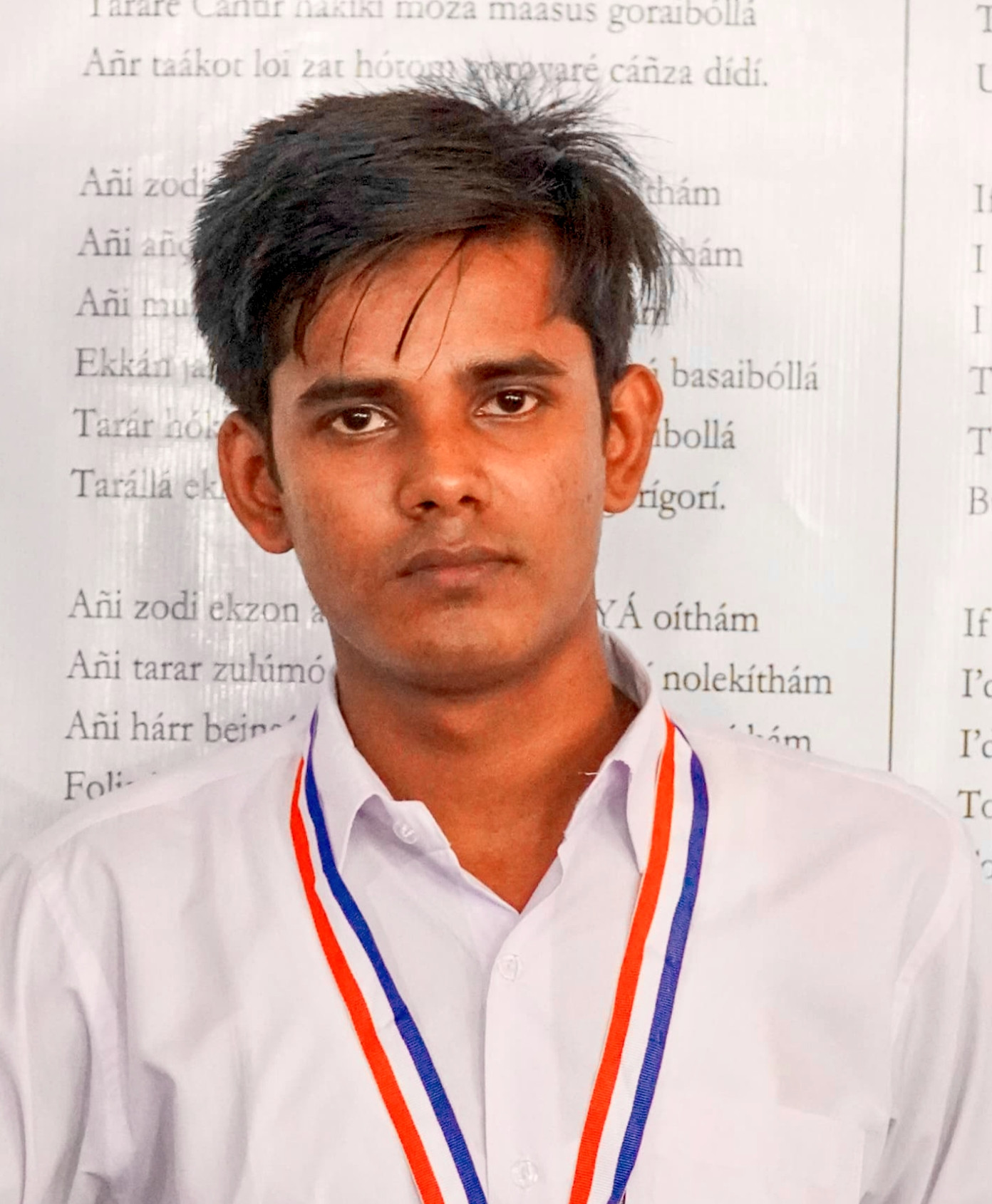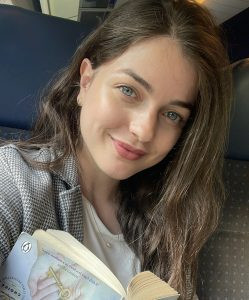Translated from Original in Arabic below by: Alice Youssef, Palestinian translator, blogger, researcher and poet.
I cannot recall the precise moment when writing first began — perhaps because it was not something I learned, but something I was born with. I did not study how to summon inspiration, nor did I master its functional tools in the early days. Those came later, with the weight of years: characters, climax, internal monologues. I can clearly recall that writing, all along, was like birth: something natal; it was never a luxury for me but a necessity — like food, water, air, and breath itself.Yet, since the genocide began, a blow landed at the core of my writing. It silenced my tongue, stilled my fingers, leaving my heart swollen; an immense balloon, too large for my chest to hold. It carried within it a breadth and weight of words so heavy that they could no longer be released.
Everything quickened — life itself ran at a pace that stripped me of faith in the worth and nobility of what I once wrote and once believed sustained me. For instance, how can you write about love when hunger gnaws your insides? How can you write about missing your beloved who lies suffocating beneath the rubble? How can you write about your ambition and grander desires when all you long for is a loaf of bread and a sack of flour — flour mixed with the blood of those standing in a long line waiting for their turn at the meager Tekkyieh (charitable food bank)? There, in the same queue, the same people are rained down by thirsty, murderous bullets.
You cannot write about loving your homeland when your homeland is being bombed. When, before your eyes, you see women and children slaughtered, men sniped down at the foot of food distribution points by a sadistic killer — it is a game being played: the bodies must remain down on the ground; even raising the head one centimeter guarantees a hit by a bullet that blows a skull open. It is as if this killer is tired of virtual sniping games on the Internet and has now switched to a play on the ground: kill real people. Perhaps that is greater entertainment to him.
Contrary to my nature, I used to write because I am a dreamer and because I see how life plays out beautifully in writing. I regard fiction as beautiful; I escape from my besieged reality and fly among the clouds. I fly over all countries and cross all borders like a kite: no passport demanded, no permit required. I fly away like a melody hidden in a musical note by Omar Khairat: when his fingers touch the keys, he plays me my butterflies take flight across space; these fly all the way to the seventh heaven and then land on one of the pages of my notebooks. The notebooks are piled up in the third drawer of my small room in the Tel al-Hawa neighborhood of Gaza. There, slumber finds the butterflies, wrapped among my diaries, before my mother catches the butterflies red-handed with the charge of taking up space—for my mother hastens to throw away anything she deems useless before her, driven by the narrowness of space and place.
All these notebooks, memoirs, all my writings, poems, and lyrics of my favorite songs were burnt. A rocket that can blow up a mountain — one we were used to hearing land over our heads — turned the whole residential building into dust. I didn't cry over the memories; I didn't have a right to cry over my memories, my words, my clothes, or the bottle of perfume I had hidden on the top shelf because I didn't have enough baggage allowance to carry all my memories in the only suitcase I packed when I left Gaza to complete my graduate studies in the UK. Naively, I had expected that I would return to find my life the same — in a country where no stone is left unturned for two days straight!
I had no right to cry over the slaying of writings and memories in the presence of the loss of human lives. In my homeland, my occupied homeland, Palestine — the land of deferred death, as I called it in my first novel This Stone Is Mine — we all live knowing that we are all dead: children or the elderly; if death jumps over us today, its arrow will not falter to catch us tomorrow!
When I think about the process of writing now, I am reminded of Ernest Hemingway's words: “There is nothing to write. All you do is sit down at a typewriter and bleed.”
When I close my eyes, bleeding is all I see: red bloodstains on white paper. I only see the faces of my dentistry colleagues at Al-Azhar University who were killed during the current genocide in Gaza: Areej Eid, Amin Al-Bahtiti, Tasneem Abdel Nabi, Israa Al-Nuwairi, Muslim Radi. I can only see the faces of my journalist friends. I do not forget the picture of Batoul Hammad, the child who used to lead a camp for Qur’an memorization for children, giving them refreshments after class. I cannot stop hearing the voice of Hind Rajab begging the ambulance to pull her out of the vehicle, where she was surrounded by the dead bodies of her sibling and relatives, before the Israeli soldier fired more than forty bullets toward her and she joined those who were killed before her.
I can only see the radiant face of my friend Doaa Abu Samra, with her single orphan dimple on the right cheek. If I want to write, I can only write about Doaa's warm hands, as she used to hold my hands in cold mornings — holding them finger by finger and rubbing them with both hands until the fingers came out of the freezing phase to warmth. Doaa's hands were always warm, and that was the most beautiful feeling in the world. She had a favorite blue manicure — light blue, if memory doesn't betray me — and she sat next to me on the fourth seat in the row in secondary school (the last stage of high school) in 2016. She used to read romantic fiction, listen to Fairuz, and love the song “Watani Ya Jabal al-Gaim al-Azrak” [My Homeland, O Mountain of Blue Clouds ]. In general, she loved the color blue; I learned later that blue is associated with sadness. I don't think Doaa knew that — for her it was the color of joy and love. Douaa is gone. They bombed her uncle’s house, the place where she and her family had sought refuge, and like every corner of Gaza, it offered no safety. The Israeli planes struck, and Doaa was killed. Until now, I have not dared to ask where her body lies. Did it remain beneath the rubble, entombed in the ruins? Or did others manage to gather what was left of her and carry it to a grave? I cannot bring myself to imagine her trapped under stone, nor can I imagine her stilled into a cold body stripped of its soul. The DoaaI hold in memory arrives only as warmth, as joy, as a radiant presence that brightens hearts simply by existing.
Doaa left her family, friends, and loved ones; she left us the remains of the blues — one dipped in sadness. I will no longer hear Doaa laugh to take away blue’s misery and gloom.
I keep asking for writing’s resuscitation — an urgent plea. I can't write; the most comfortable thing for me now is not to speak and not to write. It is a state of muteness after and during the disaster. I recently met Ghada Karmi at one of the lectures of the conference on Middle East studies in Newcastle (BRISMES Annual Conference). She held a seminar to talk about her new novel Murjana: A Novel of Medieval Baghdad. I believe Murjana is the second wife of one of the caliphs in the eighth or ninth century — I toss out an assumption with such ease, collapsing two entire centuries into a gesture, as though two hundred years — with all their upheavals and transformations — were a trifle. I speak of them so lightly and question how many countless lives were born and extinguished within that span. Yet this is the human way: once time recedes, its vastness shrinks before us. It is like riding a bus, or better yet a train, its engine thundering forward, and as it speeds away, everything behind it grows smaller and smaller.
Let me quote Radwa Ashour here. In her novel The Woman from Tantoura: A Novel from Palestine [Al-Tantouriya] she states: “I look at events from the hilltop of life, and from there I see them spread out below me. It takes only a step to the right or a step back for the entire landscape beneath the hill to unfold, clear and describable.”
With age, everything becomes reducible to a summary; even the most immense, searing experiences lose their fire. They cool, they contract, they shrink until they can be held lightly in thought. Perhaps one day I will stand on the final hill of my life and recount everything as though the details no longer matter as fiercely as they do now. I write my life on a sheet of paper, crumble it in my hand, make of it a kite, or a small rocket, or a ship; I fling it onto the water, and it leaves me, drifts away, memory recedes far off — yet it does not leap at me “like rabid dogs,” as Radwa once termed it.
Translated from Arabic by Alice Yousef
ARABIC ORIGINAL
الكتابة خلال الإبادة: محاولةٌ للاختناق من جديد
لا أذكر متى بالضبط بدأت عملية الكتابة، كانت شيئًا ولد معي، لم أتعلم مهاراته، ولا كيفية جلب إلهامه، ولا كل التفاصيل المرتبطة بالكتابة التي علمتها مع تقدم العمر من عقدة وشخصيات إلهامه، ولا كل التفاصيل المرتبطة بالكتابة التي علمتها مع تقدم العمر من عقدة وشخصيات وحوار داخلي.. أذكر أن الكتابة كما الولادة، ولدت معي، وكانت ضرورةً في الحياة لا رفاهية، كالأكل والشرب، والهواء الجوي، لكنّ ضربة ما أصابت عمق الكتابة لدي منذ تاريخ ابتداء الإبادة عقدت لساني عن الكلام، وأناملي عن الكتابة، حتى قلبي أشعر به صار بالونًا كبيرًا، أكبر من أن يحتويه قفصي الصدري.. صار بلا قدرة على البوح تُنفس عنه شيئًا من جلبته!
لا أذكر متى بالضبط بدأت عملية الكتابة، كانت شيئًا ولد معي، لم أتعلم مهاراته، ولا كيفية جلب إلهامه، ولا كل التفاصيل المرتبطة بالكتابة التي علمتها مع تقدم العمر من عقدة وشخصيات وحوار داخلي.. أذكر أن الكتابة كما الولادة، ولدت معي، وكانت ضرورةً في الحياة لا رفاهية، كالأكل والشرب، والهواء الجوي، لكنّ ضربة ما أصابت عمق الكتابة لدي منذ تاريخ ابتداء الإبادة عقدت لساني عن الكلام، وأناملي عن الكتابة، حتى قلبي أشعر به صار بالونًا كبيرًا، أكبر من أن يحتويه قفصي الصدري.. صار بلا قدرة على البوح تُنفس عنه شيئًا من جلبته!
الأحداث تسارعت جدًا وفقدتُ القيم والمعاني النبيلة التي كنتُ أكتب لها وعنها، وأحيا بها، فلا كتابة عن الحب مثلًا في حضرة الجوع، ولا كتابة عن الشوق للمحبوب والمحبوب مخنوق تحت الأنقاض، ولا كتابة عن الشغف وأقصى الطموح رغيف خبز وكيس طحين مخلوط بدم الواقفين في طابور طويل بانتظار دورهم على تكية الطعام الشحيح، تتصيدهم رصاصاتٌ متعطشة للقتل!
الأحداث تسارعت جدًا وفقدتُ القيم والمعاني النبيلة التي كنتُ أكتب لها وعنها، وأحيا بها، فلا كتابة عن الحب مثلًا في حضرة الجوع، ولا كتابة عن الشوق للمحبوب والمحبوب مخنوق تحت الأنقاض، ولا كتابة عن الشغف وأقصى الطموح رغيف خبز وكيس طحين مخلوط بدم الواقفين في طابور طويل بانتظار دورهم على تكية الطعام الشحيح، تتصيدهم رصاصاتٌ متعطشة للقتل! ولا توجد كتابة عن حب الوطن، والوطن يقصف أمامك مرأى العين ويذبح فيه الأطفال والنساء، ويُقنص الرجال على أبواب نقاط توزيع الطعام المزعومة، يلعبُ بهم القاتل السادي، يجب على الكل الانبطاح على الأرض، ومن يفكر أن يرفع رأسه سنتميرًا واحدًا تصيبه طلقة تفجر الدماغ، كأن هذا القاتل قد ملّ من ألعاب القنص والقتال على الإنترنت واختار أن يلعب على أرض الواقع ويقتل بشرًا حقيقيين، ربما ذلك أمتع! على عكس طبيعتي، كنت أكتب لأني حالمة، ولأني أرى الحياة في الكتابات جميلة، وفي الخيالات جميلة، أهرب من واقعي المحاصر فأطير بين الغيوم، أُحلق فوق كل البلدان وأتجاوزُ كل الحدود "كطائرة ورقية " لا يسألها أحد عن جواز سفرٍ ولا عن تصريح، أو حتى كمعزوفةٍ موسيقية مختبئة في نوتة عمر خيرت، وحين يعزفني تطير فراشاتي في المكان، تصل السماء السابعة ربما، ثم ترجع لتحط على أحد صفحات دفاتري المكومة في الدرج الثالث من غرفتي الصغيرة في حي تل الهوا بمدينة غزة، تغفو هناك متدثرةً بين دفاتر مذكراتي قبل أن تقبض عليها أمي متلبسة بتهمة ضيق المساحة، إذ إن أمي تسارع في رمي كل شيء تجده بلا فائدة أمامها لضيق المساحات والمكان.
كل هذه الدفاتر، والمذكرات، كل كتاباتي وأشعاري وكلمات أغنياتي المفضلة حُرقت، نزل عليها أحد صواريخ تفجير الجبال التي اعتدنا أن تُرمى فوق رؤوسنا، أحالت كل العمارة السكنية إلى تراب، لم أبكِ على الذكريات، لم يكن من حقي أن أبكِ لا على مذكراتي ولا كلماتي ولا ملابسي ولا زجاجة عطر خبئتها في الرف العلوي لأنه ليس معي وزن كافي لأحمل كل ذكرياتي في شنطة السفر التي أخذتها معي عندما غادرت غزة لإكمال دراستي العليا ببريطانيا، بسذاجة ما كان يهيؤ لي أني سأرجع، وأجد كل شيء على حاله في وطن لا يبقى فيه حجر على حجر لمدة يومين متواصلين!
لم يكن من حقي البكاء على قتل الكتابات والذكريات في حضرة إزهاق الأرواح وقتل الإنسان!
في وطني، في وطني المحتل، فلسطين، وطن الموت المؤجل -كما كتبت عنه في روايتي الأولى "هذا الحجرُ لي"-، كلنا نعيش فيه ونحن نعلم أننا كلنا ميتون، أطفالًا كنا أم شيوخًا، وإن قفز عنا القتل اليوم، فلن يخطئنا سهمه غدًا!
حين أفكر بعملية الكتابة الآن لا يحضرني سوى قول ارنست هيمجواي: “There is nothing to writing. All you do is sit down at a typewriter and bleed”
لا يحضرني سوى النزيف، لا أرى سوى حمرة الدم على بياض الورق، لا أرى سوى وجوه زملاء دفعتي في طب الأسنان بجامعة الأزهر الذين قتلوا خلال الإبادة الحالية على غزة: أريج عيد، أمين البحطيطي، تسنيم عبد النبي، إسراء النويري، مسلم راضي، لا استطيع سوى أن أرى وجوه أصدقائي الصحفيين، لا تغيب عني صورة " بتول حماد" الطفلة التي كانت تقود مخيمًا لتحفيظ القرآن للأطفال وتوزع عليهم المرطبات، ولا يسيطر على سمعي سوى صوت هند رجب وهي تتوسل طواقم الإسعاف أن ينتشلوها من المركبة حيث أحيطت بجثث إخوتها وأقاربها، قبل أن يطلق عليها الجندي الإسرائيلي أكثر من 40 رصاصة داخل المركبة فتلحق بركب المقتولين!
لا أستطيع إلا أن أرى وجه صديقتي دعاء الصبوح، بغمازتها اليتيمة على الخد الأيمن، إذا أردت أن أكتب فلا أكتب إلا عن يدي دعاء الدافئتين حيث كانت تمسك بيديّ في الصباحات الباردة، تمسكهما أصبعًا أصبعًا وتفركها بكلتا يديها حتى يخرج الأصبع من طور التجمد إلى الدفء، كانت يدي دعاء دافئة دائمًا، وكان ذلك أجمل شعور في العالم، وكان لديها مناكير أزرق مفضل، أزرق فاتح إن لم تخني الذاكرة، وتجلس بجانبي على المقعد الرابع في الصف الثاني الثانوي "آخر مرحلة دراسية في المرحلة الثانوية" عام 2016، وكانت تقرأ روايات الحب، وتسمع فيروز، وتحب أغنية "وطني يا جبل الغيم الأزرق"، بشكل عام كانت تحب دعاء اللون الأزرق، بعد فترة طويلة علمت أن الأزرق مرتبط بالحزن، لا أعتقد أن دعاء كانت تعلم ذلك، كان بالنسبة لها لون البهجة والفرح، والحبّ، رحلت دعاء عني، قصفوا منزل عمها الذي كانت تنزح إليه هي وعائلتها، لا مكان آمن في غزة، قصفتهم الطائرات الإسرائيلية، قُتلت دعاء، ولم أجرؤ حتى هذه اللحظة عن السؤال، أين جثمان دعاء؟ هل بقي تحت الأنقاض؟ أم أفلحوا في إخراج ما تبقى منه إلى أحد القبور؟ لا أستطيع أن أتخيل أن دعاء تحت الأنقاض، لا أستطيع أن أتخيلها جسدًا باردًا بلا روح، لا تحضرُ دعاء الذاكرة إلا وهي تتوهج دفئًا وفرحًا يبعث البهجة في القلوب! رحلت دعاء عن عائلتها وأصدقائها وأحبائها، وتركت لنا الجزء المتبقي من اللون الأزرق -المغموس بالحزن-، ولا توجد ضحكة دعاء بعد اليوم تخفف من بؤسه وكآبته!
حاولت أن أقول لكثيرين أن يسعفوني بعملية تنفس كتابية عاجلة، فأنا لا أستطيع الكتابة، أكثر شيء مريح لي الآن هو عدم الكلام، وعدم الكتابة، هي حالة خرسِ ما بعد الكارثة وخلالها! ؤخرًا التقيت غادة الكرمي في أحد محاضرات مؤتمر دراسات الشرق الأوسط بنيوكاسل (BRISMS)، كانت في ندوة للحديث عن روايتها الجديدة "مرجانة"، أظن مرجانة هي زوجة ثانية لأحد الخلفاء في القرن الثامن أو التاسع، أرمي افتراضًا بهذه البساطة بين قرنين مختلفين، أستهين بمئتي سنة كاملة بكل ما فيها من معطيات وتقلبات، وأقول عاش خلالها شخص، كم من شخص ولد ومات في تلك الفترة؟! لكن هذه طبيعة الإنسان كلما طوى عنه الزمان حدثًا يصبح أصغر، وكأن المرء يركب باصًا، أوحتى قطارًا، يهدر محركه، ينطلق به بعيدًا، فتمسي الأشياء وراءه أصغر فأصغر.. علِّي أستشهد هنا برضوى عاشور من رواية الطنطورية حين قالت "أطلُّ على الأحداث من تلة العمر وأرى الأسفل، يكفي أن أتحرك خطوة يمين أو خطوة للخلف كي أكشف كل شيء تحت التلة وأصفه"، مع العمر يصبح كل شيء قابل للتلخيص، حتى أكثر الأمور ضخامة وحرقةً.. تبردُ.. تصبحُ قابلة للانكماش، تمسي أصغر فأصغر.. وربما أقف أنا فوق تلة عمري يومًا ما وبحركات بسيطة أقول كل شيء وكأن التفاصيل لا تهم -كما الآن-، أكتب عن حياتي في ورقة، أكمشها في يدي، أصنع منها طائرة ورقية، أو صاروخ صغير، أو سفينة، أرميها فوق الماء، وترحل عني، وتًبعد، تبتعد الذاكرة بعيدًا، ولا تنقضُّ عليّ "ككلاب مسعورة" على قول رضوى.
About the Author
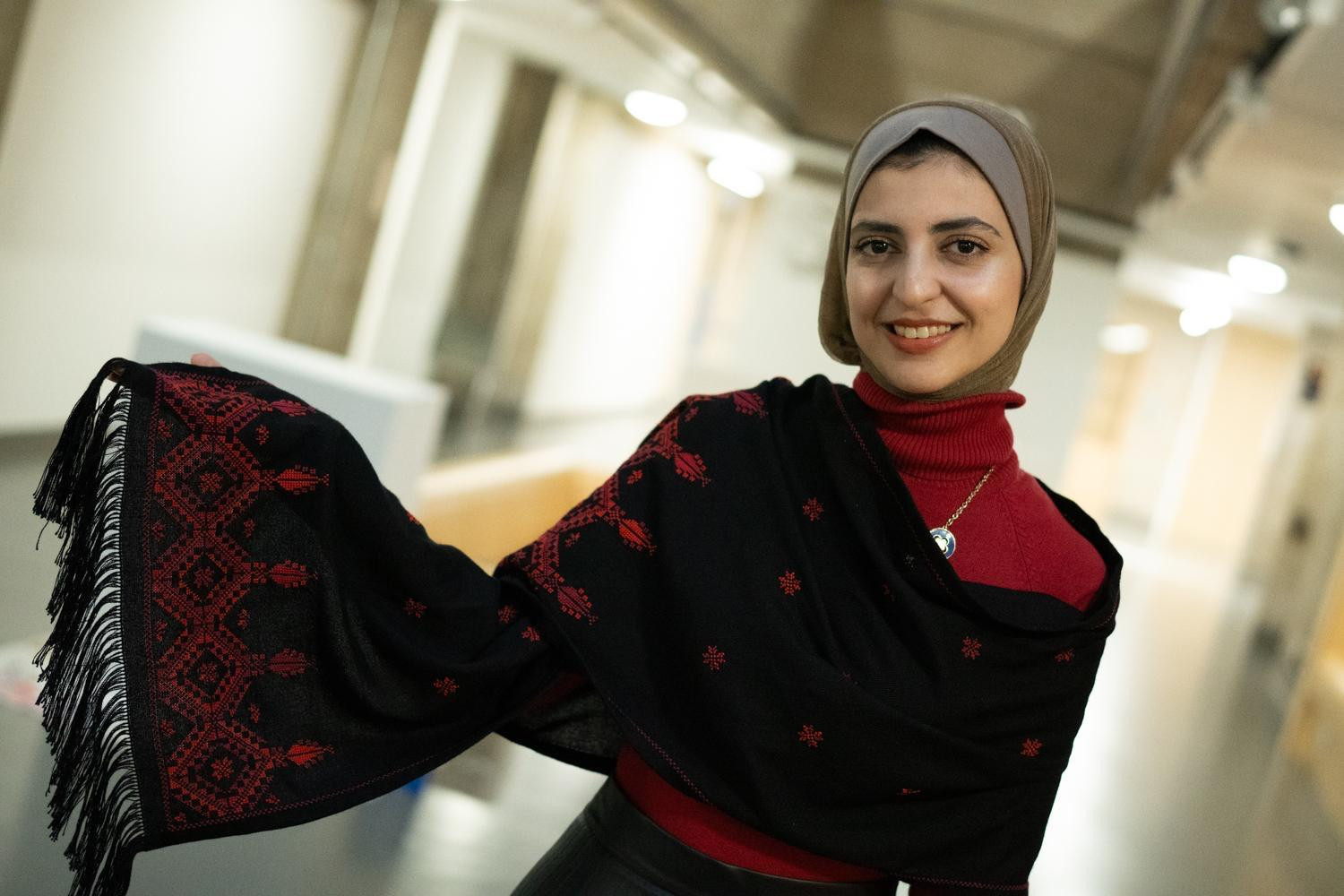
Saga Hamdan is a Palestinian author, activist, and social health researcher from Gaza, currently based in the UK. Her work centers on memory, survival, and life under siege and genocide, and has received multiple local and international literary awards.
Her debut novel This Stone Is Mine (2024) explores memory, love, and resistance under siege, and her short fiction has appeared in ArabLit Quarterly. She writes at the intersection of literature and social justice, focusing on Palestinian life, exile, and survival.
Saga was recently invited to speak at PEN International's 91st Congress in Krakòw, Poland, and her visa was inexplicably rejected, highlighting the limits placed on mobility that affects the free expression of many, especially young voices. She wrote about this experience for Electronic Intifada in an article titled "Rejected: Bureaucratic Imperialism and Endless Waiting". She still spoke remotely and passionately to the Writers in Peace Committee about starvation being used as a weapon of war in Gaza, as a testament to overcoming borders and bureaucratic discrimination.
About the Translator
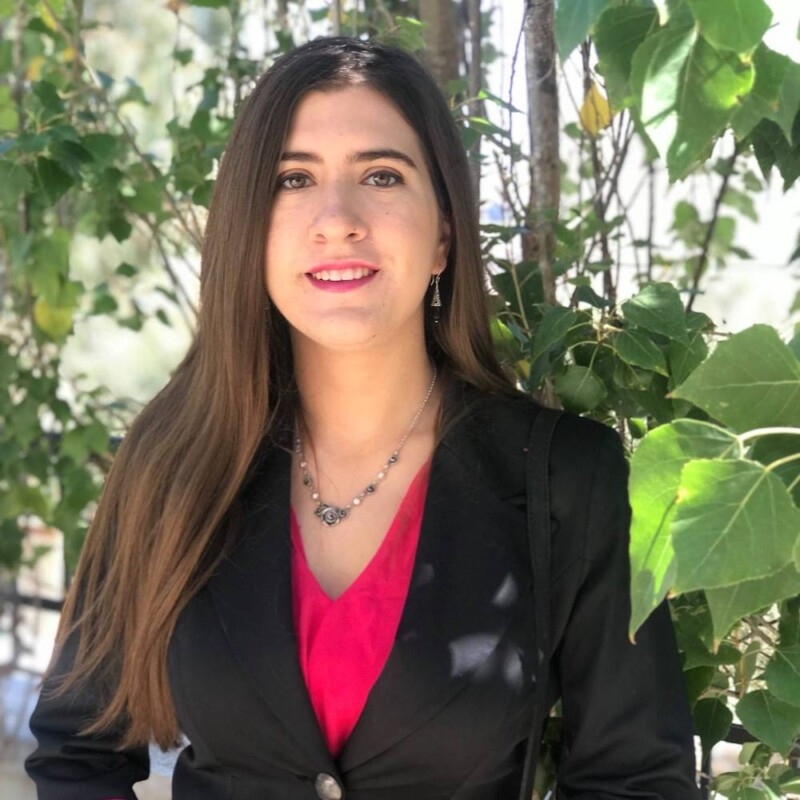
Alice S. Yousef is a Palestinian translator, blogger, researcher and poet, who has published short stories, poetry and translations. Her work can be found on various online journals, including Words Without Borders, Fikra Magazine and Visual Verse. She holds a Masters in Writing from Warwick University (UK) and was a 2016 fellow of the University of Iowa’s International Writing Program. Read LessShe is currently working on her first volume of poetry. She tweets @Aliceyousef
